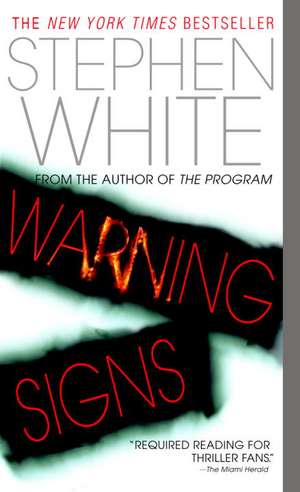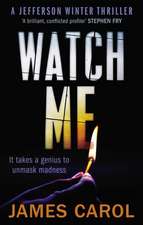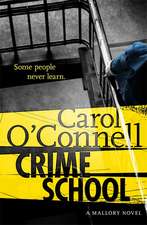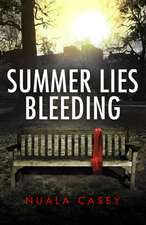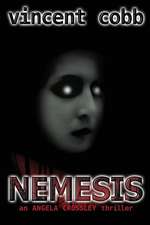Warning Signs
Autor Stephen Whiteen Limba Engleză Paperback – 31 dec 2002
The brutal slaying of Boulder’s controversial D.A. strikes deep in the heart of everything clinical psychologist Alan Gregory holds dear: After all, Alan’s wife, Lauren, worked for the dead man.
When a new patient walks into Alan’s office—a terrified mother with an explosive secret—he finds himself edging even closer to the darkness. Soon her privileged exchanges convince Alan that a crime is about to be committed. And when he uncovers a shocking link to the D.A.’s slaying, Alan is suddenly locked in the ethical dilemma of his career, thrust into a desperate manhunt for a killer whose identity no one could have guessed.
As the minutes tick down, Warning Signs explodes into a gripping story of crime and punishment, tragedy and retribution—and of human beings caught in the shattering cross fire of forces beyond their control...forces sometimes within themselves.
Preț: 61.88 lei
Nou
Puncte Express: 93
Preț estimativ în valută:
11.84€ • 12.66$ • 9.87£
11.84€ • 12.66$ • 9.87£
Carte disponibilă
Livrare economică 27 martie-10 aprilie
Preluare comenzi: 021 569.72.76
Specificații
ISBN-13: 9780440237419
ISBN-10: 0440237416
Pagini: 512
Dimensiuni: 107 x 175 x 29 mm
Greutate: 0.25 kg
Editura: dell
ISBN-10: 0440237416
Pagini: 512
Dimensiuni: 107 x 175 x 29 mm
Greutate: 0.25 kg
Editura: dell
Notă biografică
Stephen White is a clinical psychologist and New York Times bestselling author of Cold Case, Manner of Death, Critical Conditions, Remote Control, Harm's Way, Higher Authority, Private Practices, and Privileged Information. He lives in Denver, Colorado, with his wife and son.
Extras
Chapter One
Hands nipple high, palms up toward the night sky, Bruce Collamore started talking before the cops were even out of their car.
"I almost didn't call you guys. I was thinking that it was all too much like the O.J. thing. Don't you think? I mean, my dog didn't bark like that dog did, but I was walking my dog when I heard the scream. That's pretty close to the O.J. situation, isn't it? Anyway, that's why I almost didn't call. I'm still not sure I should have called. I haven't heard anything since that first scream. Right now, I think maybe it was nothing. That's what I'm beginning to think."
Two Boulder cops had responded to the 911. A coed team. Both were young, handsome, and strong.
The woman was a five-year vet on the Boulder Police force named Kerry VanHorn. She was a devout Christian who kept her religion to herself; she'd once even confided to a girlfriend that she thought proselytizing should be a capital offense. She had dirty-blond hair and a friendly Scandinavian face that put people at ease even when she didn't want to put them at ease. Over the years she'd discovered that if she squinted like she was looking into the sun people took her more seriously.
She was the first out of the squad car and the first to speak to the man who apparently remembered way too much about the O.J. case. She tucked her long flashlight under her arm and grabbed a pen before she squinted up at him--the guy was at least six five--and said, "Your name, sir?"
"Collamore, Bruce Collamore." He was wearing a ragged Middlebury College sweatshirt and an accommodating smile.
"This your house?" She gestured toward the home closest to where they were standing. Jay Street was high on the western edge of Boulder, in territory that the foothills of the Rockies seemed to have yielded only reluctantly to housing. If there was a boundary between urban and rural on the west edge of town, Jay was definitely on the side of the line that was more mountain than burg. The trees and grasses were wild and haphazard, and the curbs cut into the sides of the roadway fooled no one--this was one part of Boulder where the Rockies still reigned.
"This? My house? No. God, no."
"You live on this street, sir?"
"Here? No, I live a couple blocks over on Pleasant. I was out walking Misty. This is Misty." He reached down and tousled his dog's ears. The yellow Lab dipped her head and wagged her tail. Bruce Collamore and his dog both seemed eager to please.
"So . . . you were out walking your dog and you heard a . . ." While she waited for him to fill in the blank, she briefly lost her focus as she entertained an unbidden association to a crush she'd had on a junior high school teacher she had thought was cute.
Collamore brought her back to the moment as though he were someone who was accustomed to being in conversations where the other party's attention was wandering. He said, "A scream, I heard a scream. A loud one. Long, too. I mean, I haven't heard that many screams in my life but it, you know, seemed longer than . . . well, a normal scream. If there is such a thing? Jeez, 'a normal scream.' Did I really say that? What's wrong with me? Anyway, I think it came from that house. I'm pretty sure it did. That one. There." Collamore pointed at the gray-and-white two-story house directly across from where they stood on the edge of the road. "I had my cell phone with me so I thought I'd go ahead and call 911. Maybe it wasn't the right thing to do. I don't know. I'm a little nervous. You can probably tell I'm nervous."
She could tell. And she wasn't sure that he was nervous only because she was a cop. That suspicion made her a little nervous, too.
His left hand was balled around the dog's leash, so she couldn't see if Collamore was married. When she looked back up at him she squinted, just in case he was thinking what she was worried he was thinking. "What time was that, sir? That you heard the scream?"
"Nine fifty-one."
She wrote down the nine before she looked up from her notepad and lifted an eyebrow. The expression of incredulity interfered with her squint.
"I checked my watch when I heard the scream. You know, the O.J. thing? I thought somebody might want to know what time it happened. It really was that kind of scream--a somebody's-killing-me scream. So I checked my watch when I heard it." He exhaled loudly and ran his fingers through his hair. "God, this is embarrassing. I shouldn't have called, should I?"
She tried to make a neutral face, but wasn't sure she'd succeeded. She said, "No need to be embarrassed. We appreciate help from citizens. Can't do our jobs without it." But she was thinking that in most cities civilians ran and hid after they called 911. In Boulder they stick around on the sidewalk with their cell phones and their yellow Labradors named Misty. And maybe they keep contemporaneous records of their movements on their Palm Pilots. For all she knew this whole situation was already being tracked live on the Net.
Boulder.
Now she looked at the house he'd identified. The dwelling was an oasis of orderliness at the end of the block, the only home that looked like it could be plopped down comfortably in one of Boulder's more sedate neighborhoods. The owners of the surrounding houses--all of which were shabby in the way old cashmere is shabby--were either celebrating their good fortune at having modest homes in such a spectacular location or they were waiting for land values to escalate even more obscenely before they sold their fixer-upper to somebody who'd scrape the lot clear and start all over. She said, "You know who lives in this house, Bruce? May I call you Bruce?"
"Sure. Here? No, I don't. Like I said, I was just walking Misty. We come this way almost every night about this time. Since we walk late, most of the time we don't see anyone. Certainly don't hear many screams. Actually, we don't hear any screams. Before tonight, anyway. We heard one tonight, didn't we, girl?" He lowered his tone at least an octave as he addressed the dog.
VanHorn watched Misty's tail sweep the ground. She said, "And that was at nine fifty-one?"
"Yes, nine fifty-one."
"Well, we'll check that out. You don't mind staying here for a few minutes in case we have some more questions? My partner and I are going to speak to whoever is inside the house."
"No, no. We don't mind at all. Misty and I are happy to stick around."
The other cop, Kerry VanHorn's partner, was Colin Carpino. He had two years on the job. He was built like a bulldog but his creamy skin was almost hairless. VanHorn sometimes teased him that she had female relatives who shaved their upper lips more often than he did. She called him Whiskers.
As they moved up the brick walk in single file, she asked, "What do you think, Whiskers?"
"I buy lunch for a week if this is anything other than a waste of time." He shifted his long Mag-Lite from his right hand to his left.
She laughed. "It's your turn to buy. You're getting lunch tonight whether this is the Great Train Robbery or the lady of the house freaking out over a spider."
Carpino hit the doorbell button by the front door. They listened as it chimed like a carillon in a cathedral, and they waited.
He knocked. They waited some more.
He hit the bell again. This time he said, "Boulder Police," right after he heard the bells begin to peal inside the house. His tenor carried in the still air. The whole neighborhood of shuttered windows and closed doors had to know now that the cops were here. VanHorn waited for lights to come on, doors to open. It didn't happen. Collamore saw her looking his way and waved at her. She didn't wave back.
Whiskers reached down and tried the latch on the door. It didn't give.
VanHorn responded by touching her holster with her fingertips. The act was a caress, almost sensual in its carelessness--and it was involuntary, like a man checking for the presence of his wallet half a minute after he leaves the automatic teller machine.
The two cops waited for someone to come to the door and tell them everything was just fine.
After most of a minute had leaked into the void between them, VanHorn said, "I'll check the back of the house." She wasn't nervous yet, but she had definitely crossed over the line that separated routine from everything else that existed on a police officer's planet. The feeling was familiar, and not entirely unwelcome. The wariness sharpened her senses. She'd been around long enough to know that wasn't a bad thing.
"I'll take a look at the windows up front here and over on the other side," Carpino said.
The north side of the house was unlit, making it difficult for VanHorn to navigate the uneven path of flagstones. Spreading junipers clotted the open spaces between the window wells. An avid gardener, she hated junipers, especially spreading junipers. She alternated the flashlight beam between the path in front of her and the windows on the side of the house and noticed nothing that alarmed her. She fingered the switch of the radio microphone that was clipped to the left shoulder of her uniform blouse and said, "Nothing unusual on the side of the house. Just some unimaginative landscaping. But even in Boulder I don't think that's a crime."
Carpino replied, "Yet. Hold on, I may have something up here, Kerry." His voice betrayed no alarm. She waited for him to continue. He didn't.
She stepped lightly into the backyard. A streetlight brightened the rear of the house. She reached up and touched the button on her microphone. "What do you have, Whiskers? Open window?"
"No, I'm on the opposite side of the house from you, shining my beam inside into what looks like the living room. I make a lamp lying on the floor and some broken glass. That's all."
After again caressing the flap on her holster with the fingertips of her right hand, Officer VanHorn spent a moment examining the backyard with the beam of her flashlight. Only when she was certain she was alone in the yard did she take determined strides across a pleasant brick patio, past an almost new gas grill, and up two steps to the door that led to the house. She grabbed the knob of the metal security door and twisted it. The door opened right up. She locked her gaze on the painted French door behind the security panel and fingered her microphone. "Back door's open. Not just unlocked, but open-open. Why don't you call for backup?"
She waited for his response long enough to inhale and exhale twice. Finally, she said, "Colin?"
He said, "Sorry. I may be looking at a person's foot, Kerry, just someone's heel. Like there's somebody lying on the floor. But I can't see past the heel. If it's a foot, then the rest of the body's behind a sofa."
VanHorn sighed. "We'd better go in. Tell dispatch."
"Will do. I'll call for backup and join you back there."
Kerry VanHorn flicked up the flap on her holster and drew her service weapon with her right hand. Her Mag-Lite was in her left. Before she took another step she squeezed her biceps against her upper torso to convince herself that she'd remembered to wear her vest. She had.
Within seconds, Whiskers joined her at the back door. He, too, had his service weapon ready. He said, "The living room's in the southwest corner. That's where I saw the foot." She nodded and said a silent prayer before she nudged the French door with the toe of her shoe. She winced as the door squeaked open.
She yelled, "Boulder Police," as she entered a big kitchen and family room. Shadowed light from the alley street lamp revealed an expensive recent remodel. Cherry cabinets. Granite countertops. Big double stainless steel sink. Appliances that disappeared into the cabinetry. One appliance she didn't even recognize. She didn't like that kitchens had developed in such a way that people used appliances she couldn't even recognize.
But nothing was out of place. She could hear Whiskers's footsteps on the hardwood floor behind her. The resonant clap was reassuring. There was almost nothing she liked doing less as a cop than walking into dark houses.
The door from the kitchen led to a short hallway. Again she called out, "Boulder Police," and waited for a reply. Nothing. Carpino repeated the announcement. After she waited for a response that never came, she stepped past a powder room and saw a dining room on her right. She played the beam into the room for two or three seconds. It didn't appear that anyone had eaten in there recently; the table was covered with piles of mail. She gestured with her flashlight to reassure her partner before she turned toward the living room. At the bottom of a staircase she flicked the beam up the stairs. She spotted nothing that alarmed her but noticed an odd device on rails attached to the side of the staircase. She also noted a rhythmic shush-shush, shush-shush, shush-shush coming down from the second floor. The sound was familiar to her but she couldn't place it. Shush-shush, shush-shush, shush-shush. The rhythm wasn't out of place in a house. She was sure of that. But what was it that she was hearing?
Darn. She couldn't place the noise.
She took two steps into the living room and swept her flashlight beam in a wide, slow arc, looking for the foot that Whiskers had seen, praying that he was wrong or, failing that, that there was at least still a person attached to it.
The first thing that caught her attention was the lamp on the floor--she assumed it was the same one that Whiskers had spotted through the window. Then she saw the broken glass, a lot of it. The glass appeared to be some kind of pottery or ceramic; it must have been a big piece before it was busted.
No foot.
Lights flashed outside on the street. VanHorn looked up and was relieved to see a patrol car slide to the curb in front of the house. Her partner whispered, "Backup's here." She adjusted the grip on her weapon and, for her own benefit, silently mouthed, "I'm doing fine. I'm doing fine."
Hands nipple high, palms up toward the night sky, Bruce Collamore started talking before the cops were even out of their car.
"I almost didn't call you guys. I was thinking that it was all too much like the O.J. thing. Don't you think? I mean, my dog didn't bark like that dog did, but I was walking my dog when I heard the scream. That's pretty close to the O.J. situation, isn't it? Anyway, that's why I almost didn't call. I'm still not sure I should have called. I haven't heard anything since that first scream. Right now, I think maybe it was nothing. That's what I'm beginning to think."
Two Boulder cops had responded to the 911. A coed team. Both were young, handsome, and strong.
The woman was a five-year vet on the Boulder Police force named Kerry VanHorn. She was a devout Christian who kept her religion to herself; she'd once even confided to a girlfriend that she thought proselytizing should be a capital offense. She had dirty-blond hair and a friendly Scandinavian face that put people at ease even when she didn't want to put them at ease. Over the years she'd discovered that if she squinted like she was looking into the sun people took her more seriously.
She was the first out of the squad car and the first to speak to the man who apparently remembered way too much about the O.J. case. She tucked her long flashlight under her arm and grabbed a pen before she squinted up at him--the guy was at least six five--and said, "Your name, sir?"
"Collamore, Bruce Collamore." He was wearing a ragged Middlebury College sweatshirt and an accommodating smile.
"This your house?" She gestured toward the home closest to where they were standing. Jay Street was high on the western edge of Boulder, in territory that the foothills of the Rockies seemed to have yielded only reluctantly to housing. If there was a boundary between urban and rural on the west edge of town, Jay was definitely on the side of the line that was more mountain than burg. The trees and grasses were wild and haphazard, and the curbs cut into the sides of the roadway fooled no one--this was one part of Boulder where the Rockies still reigned.
"This? My house? No. God, no."
"You live on this street, sir?"
"Here? No, I live a couple blocks over on Pleasant. I was out walking Misty. This is Misty." He reached down and tousled his dog's ears. The yellow Lab dipped her head and wagged her tail. Bruce Collamore and his dog both seemed eager to please.
"So . . . you were out walking your dog and you heard a . . ." While she waited for him to fill in the blank, she briefly lost her focus as she entertained an unbidden association to a crush she'd had on a junior high school teacher she had thought was cute.
Collamore brought her back to the moment as though he were someone who was accustomed to being in conversations where the other party's attention was wandering. He said, "A scream, I heard a scream. A loud one. Long, too. I mean, I haven't heard that many screams in my life but it, you know, seemed longer than . . . well, a normal scream. If there is such a thing? Jeez, 'a normal scream.' Did I really say that? What's wrong with me? Anyway, I think it came from that house. I'm pretty sure it did. That one. There." Collamore pointed at the gray-and-white two-story house directly across from where they stood on the edge of the road. "I had my cell phone with me so I thought I'd go ahead and call 911. Maybe it wasn't the right thing to do. I don't know. I'm a little nervous. You can probably tell I'm nervous."
She could tell. And she wasn't sure that he was nervous only because she was a cop. That suspicion made her a little nervous, too.
His left hand was balled around the dog's leash, so she couldn't see if Collamore was married. When she looked back up at him she squinted, just in case he was thinking what she was worried he was thinking. "What time was that, sir? That you heard the scream?"
"Nine fifty-one."
She wrote down the nine before she looked up from her notepad and lifted an eyebrow. The expression of incredulity interfered with her squint.
"I checked my watch when I heard the scream. You know, the O.J. thing? I thought somebody might want to know what time it happened. It really was that kind of scream--a somebody's-killing-me scream. So I checked my watch when I heard it." He exhaled loudly and ran his fingers through his hair. "God, this is embarrassing. I shouldn't have called, should I?"
She tried to make a neutral face, but wasn't sure she'd succeeded. She said, "No need to be embarrassed. We appreciate help from citizens. Can't do our jobs without it." But she was thinking that in most cities civilians ran and hid after they called 911. In Boulder they stick around on the sidewalk with their cell phones and their yellow Labradors named Misty. And maybe they keep contemporaneous records of their movements on their Palm Pilots. For all she knew this whole situation was already being tracked live on the Net.
Boulder.
Now she looked at the house he'd identified. The dwelling was an oasis of orderliness at the end of the block, the only home that looked like it could be plopped down comfortably in one of Boulder's more sedate neighborhoods. The owners of the surrounding houses--all of which were shabby in the way old cashmere is shabby--were either celebrating their good fortune at having modest homes in such a spectacular location or they were waiting for land values to escalate even more obscenely before they sold their fixer-upper to somebody who'd scrape the lot clear and start all over. She said, "You know who lives in this house, Bruce? May I call you Bruce?"
"Sure. Here? No, I don't. Like I said, I was just walking Misty. We come this way almost every night about this time. Since we walk late, most of the time we don't see anyone. Certainly don't hear many screams. Actually, we don't hear any screams. Before tonight, anyway. We heard one tonight, didn't we, girl?" He lowered his tone at least an octave as he addressed the dog.
VanHorn watched Misty's tail sweep the ground. She said, "And that was at nine fifty-one?"
"Yes, nine fifty-one."
"Well, we'll check that out. You don't mind staying here for a few minutes in case we have some more questions? My partner and I are going to speak to whoever is inside the house."
"No, no. We don't mind at all. Misty and I are happy to stick around."
The other cop, Kerry VanHorn's partner, was Colin Carpino. He had two years on the job. He was built like a bulldog but his creamy skin was almost hairless. VanHorn sometimes teased him that she had female relatives who shaved their upper lips more often than he did. She called him Whiskers.
As they moved up the brick walk in single file, she asked, "What do you think, Whiskers?"
"I buy lunch for a week if this is anything other than a waste of time." He shifted his long Mag-Lite from his right hand to his left.
She laughed. "It's your turn to buy. You're getting lunch tonight whether this is the Great Train Robbery or the lady of the house freaking out over a spider."
Carpino hit the doorbell button by the front door. They listened as it chimed like a carillon in a cathedral, and they waited.
He knocked. They waited some more.
He hit the bell again. This time he said, "Boulder Police," right after he heard the bells begin to peal inside the house. His tenor carried in the still air. The whole neighborhood of shuttered windows and closed doors had to know now that the cops were here. VanHorn waited for lights to come on, doors to open. It didn't happen. Collamore saw her looking his way and waved at her. She didn't wave back.
Whiskers reached down and tried the latch on the door. It didn't give.
VanHorn responded by touching her holster with her fingertips. The act was a caress, almost sensual in its carelessness--and it was involuntary, like a man checking for the presence of his wallet half a minute after he leaves the automatic teller machine.
The two cops waited for someone to come to the door and tell them everything was just fine.
After most of a minute had leaked into the void between them, VanHorn said, "I'll check the back of the house." She wasn't nervous yet, but she had definitely crossed over the line that separated routine from everything else that existed on a police officer's planet. The feeling was familiar, and not entirely unwelcome. The wariness sharpened her senses. She'd been around long enough to know that wasn't a bad thing.
"I'll take a look at the windows up front here and over on the other side," Carpino said.
The north side of the house was unlit, making it difficult for VanHorn to navigate the uneven path of flagstones. Spreading junipers clotted the open spaces between the window wells. An avid gardener, she hated junipers, especially spreading junipers. She alternated the flashlight beam between the path in front of her and the windows on the side of the house and noticed nothing that alarmed her. She fingered the switch of the radio microphone that was clipped to the left shoulder of her uniform blouse and said, "Nothing unusual on the side of the house. Just some unimaginative landscaping. But even in Boulder I don't think that's a crime."
Carpino replied, "Yet. Hold on, I may have something up here, Kerry." His voice betrayed no alarm. She waited for him to continue. He didn't.
She stepped lightly into the backyard. A streetlight brightened the rear of the house. She reached up and touched the button on her microphone. "What do you have, Whiskers? Open window?"
"No, I'm on the opposite side of the house from you, shining my beam inside into what looks like the living room. I make a lamp lying on the floor and some broken glass. That's all."
After again caressing the flap on her holster with the fingertips of her right hand, Officer VanHorn spent a moment examining the backyard with the beam of her flashlight. Only when she was certain she was alone in the yard did she take determined strides across a pleasant brick patio, past an almost new gas grill, and up two steps to the door that led to the house. She grabbed the knob of the metal security door and twisted it. The door opened right up. She locked her gaze on the painted French door behind the security panel and fingered her microphone. "Back door's open. Not just unlocked, but open-open. Why don't you call for backup?"
She waited for his response long enough to inhale and exhale twice. Finally, she said, "Colin?"
He said, "Sorry. I may be looking at a person's foot, Kerry, just someone's heel. Like there's somebody lying on the floor. But I can't see past the heel. If it's a foot, then the rest of the body's behind a sofa."
VanHorn sighed. "We'd better go in. Tell dispatch."
"Will do. I'll call for backup and join you back there."
Kerry VanHorn flicked up the flap on her holster and drew her service weapon with her right hand. Her Mag-Lite was in her left. Before she took another step she squeezed her biceps against her upper torso to convince herself that she'd remembered to wear her vest. She had.
Within seconds, Whiskers joined her at the back door. He, too, had his service weapon ready. He said, "The living room's in the southwest corner. That's where I saw the foot." She nodded and said a silent prayer before she nudged the French door with the toe of her shoe. She winced as the door squeaked open.
She yelled, "Boulder Police," as she entered a big kitchen and family room. Shadowed light from the alley street lamp revealed an expensive recent remodel. Cherry cabinets. Granite countertops. Big double stainless steel sink. Appliances that disappeared into the cabinetry. One appliance she didn't even recognize. She didn't like that kitchens had developed in such a way that people used appliances she couldn't even recognize.
But nothing was out of place. She could hear Whiskers's footsteps on the hardwood floor behind her. The resonant clap was reassuring. There was almost nothing she liked doing less as a cop than walking into dark houses.
The door from the kitchen led to a short hallway. Again she called out, "Boulder Police," and waited for a reply. Nothing. Carpino repeated the announcement. After she waited for a response that never came, she stepped past a powder room and saw a dining room on her right. She played the beam into the room for two or three seconds. It didn't appear that anyone had eaten in there recently; the table was covered with piles of mail. She gestured with her flashlight to reassure her partner before she turned toward the living room. At the bottom of a staircase she flicked the beam up the stairs. She spotted nothing that alarmed her but noticed an odd device on rails attached to the side of the staircase. She also noted a rhythmic shush-shush, shush-shush, shush-shush coming down from the second floor. The sound was familiar to her but she couldn't place it. Shush-shush, shush-shush, shush-shush. The rhythm wasn't out of place in a house. She was sure of that. But what was it that she was hearing?
Darn. She couldn't place the noise.
She took two steps into the living room and swept her flashlight beam in a wide, slow arc, looking for the foot that Whiskers had seen, praying that he was wrong or, failing that, that there was at least still a person attached to it.
The first thing that caught her attention was the lamp on the floor--she assumed it was the same one that Whiskers had spotted through the window. Then she saw the broken glass, a lot of it. The glass appeared to be some kind of pottery or ceramic; it must have been a big piece before it was busted.
No foot.
Lights flashed outside on the street. VanHorn looked up and was relieved to see a patrol car slide to the curb in front of the house. Her partner whispered, "Backup's here." She adjusted the grip on her weapon and, for her own benefit, silently mouthed, "I'm doing fine. I'm doing fine."
Recenzii
“A page-turner.”
--The Philadelphia Inquirer
“An edge-of-your-seat thriller.”
--The Chattanooga Free Press
“A tight, riveting conclusion that is horrifyingly scary.”
--Rocky Mountain News
--The Philadelphia Inquirer
“An edge-of-your-seat thriller.”
--The Chattanooga Free Press
“A tight, riveting conclusion that is horrifyingly scary.”
--Rocky Mountain News
Descriere
The brutal slaying of Boulder's controversial DA strikes deep in the heart of everything clinical psychologist Alan Gregory holds dear: after all, Gregory's wife Lauren worked for the dead man. But the bloodied body is just the first in a series of high-voltage incidents in a gripping story of crime and punishment, tragedy and retribution.
